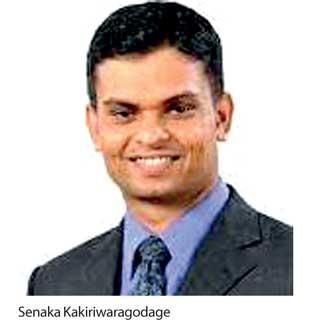22 Oct 2021 - {{hitsCtrl.values.hits}}
A complete overhaul in the country’s incentive and education systems is of paramount importance to reverse brain drain, which has been a nagging issue for Sri Lanka, a trend which became more pronounced in the recent past due to a combination of factors, according to an economic analyst.
 There cannot be a worst combination for a country stuck in the middle-income trap than losing its key talent and the people of their prime working age for other nations while its own population is ageing fast.
There cannot be a worst combination for a country stuck in the middle-income trap than losing its key talent and the people of their prime working age for other nations while its own population is ageing fast.
And the solution is two pronged, according to Senaka Kakiriwaragodage, the Chief Executive Officer at NDB Capital Holdings Limited.
“I think it’s important to give the young, educated population hope,” Kakiriwaragodage said speaking at an online forum organised by Postgraduate Institute of Management, a few weeks ago.
“One challenge if you think from an individual point of view is that, for you to come to a certain stage of life like building a house or owning a car, it could cost you probably your entire life as per the current economics here,” he added in a true depiction of what’s generally in store for a large majority of even the educated youth in Sri Lanka, who enter the job market.
Sri Lanka’s economy is such that a large majority struggles even to make their ends meet and the pandemic-induced economic malaise exacerbated the situation with loss of incomes and jobs, while soaring prices adding to the woes. Basic needs such as housing and personal transport have become higher-end needs in the Sri Lankan society and a typical middle-income class family ends up spending their entire working lives in trying to finance such assets. Therefore, Kakiriwaragodage suggested to introduce incentive schemes by way of tax concessions for those who want to acquire such assets in order to prevent them from losing to other more economically advanced countries where access to such assets are relatively easy and, offer better life and career prospects. “So it’s important that you give some sort of incentives while you give certain facilities for certain bureaucrats and politicians,” he said.
“And could you have a mechanism if you have been in a certain profession for, say 10 years, to get certain duty concessions in terms of owning some of these assets because it is important to retain these people because they will be the key contributors to economic growth?”
Sri Lanka is currently preparing its national budget for the next year to be presented in November under the most strenuous financing conditions created by the pandemic, but the budget could provide a platform for the government to close, if not minimise the drain of key Sri Lankan talent to overseas. Kakiriwaragodage further suggested to introduce educational reforms in earnest—something which has been a talking point for decades but not much progress been made—to provide the youth with the high end skills in the areas of STEM—science, technology, engineering and mathematics— and other vocational training, which are particularly in high demand and have higher earning potential. These educational reforms not only will reduce brain drain because people will have marketable and highly employable skills with higher salaries, but also will attract investments from both overseas and domestic sources as investors typically go where they can find skilled people to work for them. This will naturally provide solutions for unemployment, under-employment, and more importantly the low incomes and poverty which are plaguing the Sri Lankan economy for decades, potentially shrinking nearly 3.0 million engaged in three-wheeler driving and public service while drawing many millions from highly unproductive agriculture sector, which has excess labour.
17 Nov 2024 2 hours ago
17 Nov 2024 3 hours ago
17 Nov 2024 5 hours ago
17 Nov 2024 5 hours ago
17 Nov 2024 6 hours ago